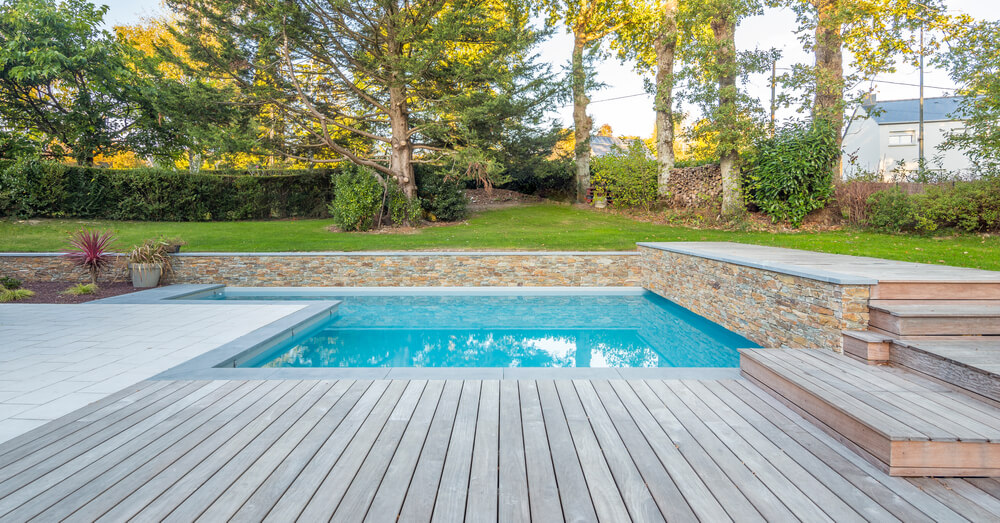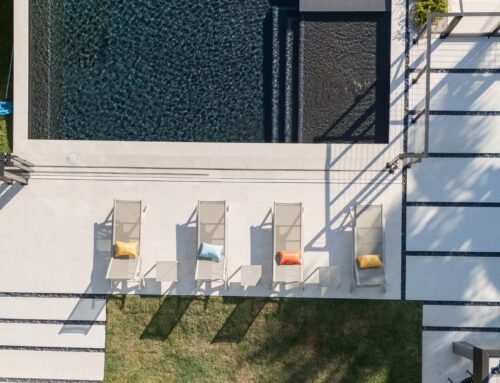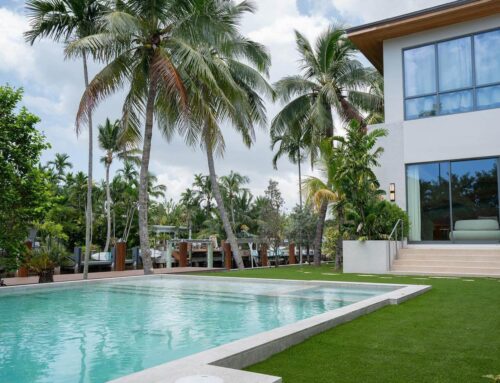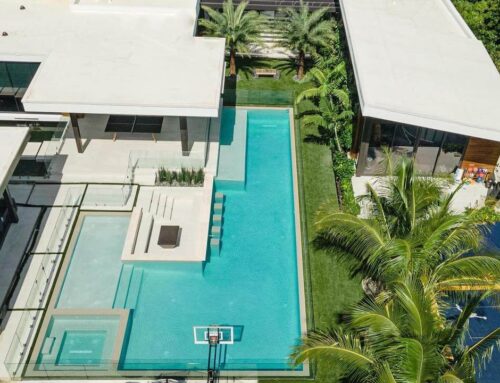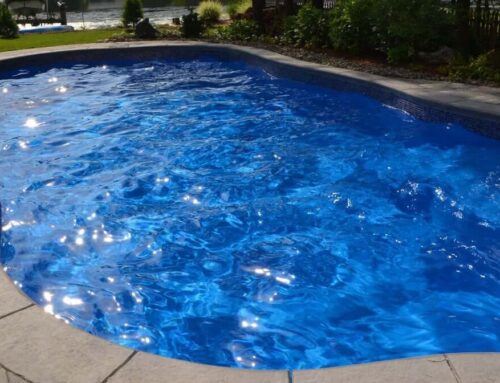If you choose a suitable material and give it the proper care, pool decking can last up to 25 years or more. However, fail to do so, and you may find yourself replacing your above-ground pool deck as often as every 8–10 years.
Below, we’ll lay out the most common options for pool deck materials to use and how to pick one. By the end, you’ll have a solid grasp of the best material for your pool, and you’ll be able to make an educated decision.
Pool Deck Ideas — Available Materials
Outside of particular circumstances, you’ll have access to the six materials listed below for your pool deck. But don’t let that discourage you. Likely, one of these six is both aesthetically and practically ideal for your pool.
Concrete Above Ground Pool Deck
Let’s start with the most common material: concrete. Concrete has been a mainstay of the pool construction industry for decades, and it’s still an excellent choice. Concrete has excellent water resistance and durability.
The pros of concrete include its versatility. Stamped concrete can approximate the appearance of natural surfaces or any design you choose. Brushed concrete also forms a rough surface that’s non-slippery and safe for wet feet. Concrete is also adaptable to any shape, so it’s appropriate for pools of all types and sizes. Lastly, it’s affordable; professional installation can cost as little as $6 a square foot.
The only downside of concrete decking is that it takes a professional to get it right. You may get away with doing a small concrete pour yourself, but even that can be touchy for various reasons. 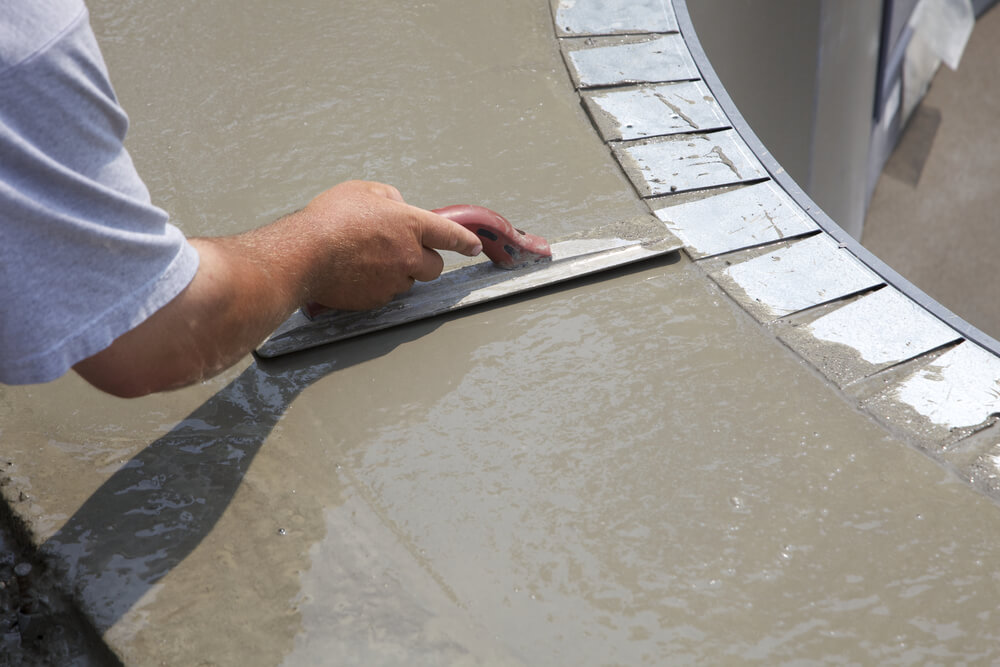
How to Build a Deck Around a Pool With Brick
Brick is a much more DIY-friendly alternative to concrete. However, it tends to have a much shorter lifespan than concrete. Brick is also a bolder aesthetic statement, it’s excellent for historic homes or retro architecture, but it won’t fit nicely with a modern pool.
Even though brick is more manageable to lay than pouring concrete, bricks are relatively small, and laying brick is time-consuming. However, the price difference between brick and concrete is minimal if you’re opting for a professional installation, so it comes down to which appearance you like best and how much time you’re ready to put into the installation.
How to Build a Deck Around a Pool with Cement Pavers
If you like the durability and accessibility of concrete but don’t have the capacity to pour a massive deck and level it, cement pavers are a more approachable alternative. You can think of them as the in-between option of brick and cement.
You also get a little more variety with pavers than you do with brick. There are several earth tones to choose from, and you can pick from various shapes and sizes. Furthermore, pavers tend to be a little easier to find than brick in some areas, so you probably won’t have to wait as long to get the materials for your deck.
And, best of all, they’re very affordable. At $2 to $4 per square foot, cement pavers are one of the cheapest alternatives for your decking. The only significant drawback is that it’s easy to mess up the installation and end up with slightly uneven pavers. Hence, it’s probably worth paying a little extra for professional installation.
Stone Tile Deck
If you’re more interested in aesthetic appeal than saving money on your deck material, stone is your go-to choice. Stone lends itself to man pool deck ideas that incorporate a natural look and organic lines.
And many people make the incorrect assumption that it’s a limiting choice. But many kinds of stones are suitable for pool decking. Limestone, sandstone, and travertine are just some of the many options out there, and they each have a specific and particular look.
The only problem with stone is the price. If you get it professionally installed, which you should, it can set you back up to $15 per square foot, depending on the type of stone you choose.
Wooden Above Ground Pool Deck
Another luxury material option, wood, is probably the least durable and the most attractive way to go. It also feels great to walk on and adds an aura of luxury to any pool. Unfortunately, you can’t use any wood for pool decking, but there’s still a wide range of choices, including teak, cedar, and redwood. You can expect to pay about $5 per square foot of wood decking along with another $5 to $10 for installation.
Aside from the relatively high price tag, wood’s other drawback is that it needs a lot of care. You’ll need to sand and reapply sealant periodically to keep it in good shape.
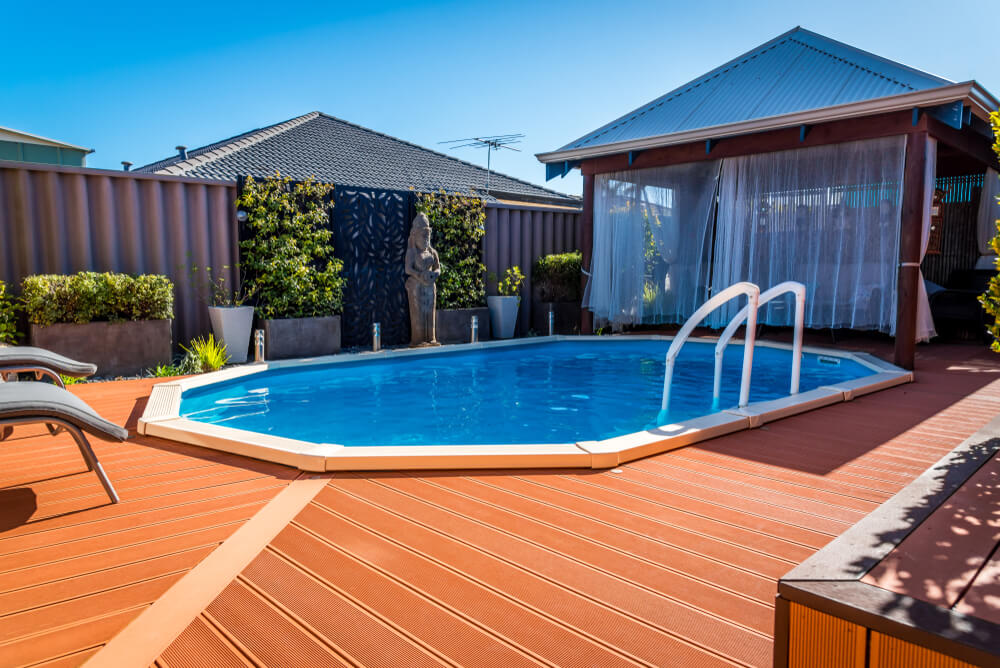
How to Choose The Right Material For An Above Ground Pool Deck
Those are five of the most common materials available, and there are a few more options you can discuss with us for special applications. But before you run off to type “deck installation near me” into your search bar, take a minute to look through these considerations.
- Think about your home value
If you choose a material purely because it can save you a few dollars today, you may be leaving a lot of money on the table when the time comes to sell your home. Conversely, if you’re redoing a pool for a resale, choose a material that will provide lasting quality but won’t break the bank, such as concrete.
- Consider your climate
If you live in an area with year-round sun, materials that don’t absorb and retain heat are often a good choice. Stone is exceptionally good at staying hot once it has received enough sunlight, so you may want to choose something less dense, like wood or concrete pavers. Also, stormy areas aren’t quite as friendly for wood decking.
- Think about your whole yard
If you only pick a material because you like how it will make your pool look, you run the risk of creating a sharp contrast with the rest of your yard. If you already took a natural approach, choose wood or stone to complement it. Yards with a more modern look might benefit more from the sharp angles of brick or stamped concrete.
- Extend the coping
An easy way to deal with which material to choose is to choose the same material used in the pool’s coping. Matching up materials this way ensures that you’ll have an even look across your yard and usually makes for a faster installation if you’re remodeling your entire pool or installing a new one.
Deck Materials For Every Pool
You’ve got all the tools you need to make an educated decision about how you want to make your deck. Now, it’s your turn to apply what you’ve learned to have the pool of your dreams.
If you still have doubts or unanswered questions, Florida Pool and Patio’s pool professionals are always at your disposal; feel free to contact us about any pool-related questions.
Did you find what you needed in this article? Then, let us know in the comments which one of the pool deck materials listed above best suits your pool.

